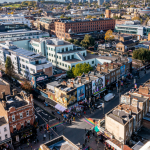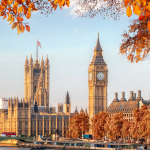Camden Town has undergone transformational change in the 16 years Simon Pitkeathley has been at the helm of the area’s Business Improvement District (BID) Camden Town Unlimited. So too has his own part in that change, with Simon also leading neighbouring Euston Town BID and two related local charities.
One of these is the Camden Highline – the reimagining of an old section of railway line modelled on a similar scheme in New York which has attracted interest from across the world. The other, Camden Collective, repurposes meanwhile space to house creative start-ups in the borough.
From its humble origins using a few “vacant shops to provide pop up retail space” Camden Collective has evolved into a major enterprise closely aligned with the Camden and Euston BIDs, in turn making them unique among London BIDs for the level of affordable space they provide for local entrepreneurs and businesses.
“We’re about to open our 19th space and we give away free space to youngish creative starts ups which I’d describe as not typically WeWork-type organisations”, he says. One of the objectives is to keep that creative vibrancy that has characterised Camden for decades, but – as the cost of doing business in the area has soared – has become much harder.
There are ambitious plans for the future, with a Section 106 agreement in the pipeline that will give Camden Collective a permanent home. Pitkeathley is clearly excited at the prospect of this next chapter in the story, but it’s also been a long process to get to this point. He refers to the challenges as like “walking through treacle” but you can’t question his optimism – nor his excitement and energy that comes from seeing people setting up new businesses, some of which – like Black Sheep Coffee – have gone on to greater success.
The vision for his other passion, the Camden Highline, is to bring back into use a stretch of Network Rail viaduct and create a new magnet for tourism and investment as well as a new park and transport link for locals. Last year Simon visited New York as part of a London Property Alliance and Opportunity London study trip. For him, despite the synergies between Camden and New York’s projects, the real learning was the difference in their respective fundraising models. “The New York philanthropic world is very different to London” he says, “we just don’t do it like that over here, and so have to think very differently about how we fundraise.”
But Camden Town is the heart of Simon’s work – it’s an area he knows like the back of his hand and he’s passionate about it as a place in which people live, work and visit. He’s also plugged in and connected to some of the most important decision makers in the city. He sits on the Mayor’s Partnership Board and is co-Chair of the Cross River Partnership (made up of nine local authorities and 16 BIDs), bringing his energy and experience to efforts to drive development and economic growth across more of the city.
What comes across from the interview is how the way the two BIDs are run differs from some others in the city. Both are serviced by the same team – as are the two charities – allowing synergies across all four. Simon has also been able to innovate and push an agenda with much wider economic and social benefits for the local area with the backing he’s received from his board. “I’ve got a fairly forgiving board” he says “who understand that sometimes things might fail” before quickly adding “although hopefully not too often!”.
Yet the areas the BIDs cover really contrast – Camden Town with its high footfall levels, the vibrancy of the markets drawing a younger and touristy crowd. Then there’s Euston – with the major railway terminus at its heart – but clouded with uncertainty over the future of the HS2 project that’s left a scar of cleared land through the area while the politicians decide what happens next.
This blight and uncertainty has left businesses suffering, and the Euston Town BID is picking up the pieces. “We’ve done a lot to help the businesses such as the restaurant trade in Drummond Street” says Pitkeathley, “and we’re trying to do some stuff in Chalton Street too but it’s all under the shadow of the uncertainty around HS2 –in any business environment, uncertainty kills”.
Simon fully recognises just how important the redevelopment of the station will be for the wider area around Euston, but he’s also sanguine about progress this side of a General Election. He describes it as a “gnarly project” and that even for the next Government, he acknowledges “their in tray is going to be pretty full”. He’s not sure that the current Government’s plan to fund the infrastructure by private sector development is feasible – “the cost is so much greater than the potential private sector gain – how you unlock it without either doing extraordinary scale of development on the site, which would feel impossible, or government putting public money on the table”. This will be one that runs and runs, with whoever wins the election under pressure to find a solution and quickly.
So how did Pitkeathley come about to be running the Camden Town BID? For a period, he worked in events management, and for the politics fans out there actually worked as a stage manager at the Labour Party’s now infamous 1992 Sheffield Rally – where Neil Kinnock’s ‘victory speech’ is widely credited with undoing Labour election chances that year, which saw John Major’s Conservatives elected to government.
Politics is an important part of Pitkeathley’s life. He comes from a political family, and following the 1992 election he worked at the Labour Party as the media centre manager at the Millbank HQ. He’s clear what drew him to politics, citing Tony Blair. “I was very incentivised and excited by the change in direction of the party and it’s pro-business stance”, he says. Staying at the party until 1999, he then worked for a period at the British Bankers Association in The City – “but then I saw this job in the Guardian that said come and be a chief executive of something called Camden Town Unlimited. It had only just been set up and I thought I’d stay for three years”.
And what of today’s politics? What is he looking for from the next Mayor and the next Government in this year of elections? From the Mayor, he would love backing for the Camden Highline, waxing lyrical about the benefits it would bring not just locally, but to the whole city. Also on his list is the overdue rebuilding of Camden Town tube station, which has been an on-off project over many years, but with a high price tag, currently unfunded in TfL’s business planning. Crime also comes up as a big concern.
When asked if these concerns stir any political ambitions of his own, he responds: “I’d be very happy to help any incoming Labour administration because that’s my family,” sounding like a consummate politician – “but nothing beyond that” he adds. Looks like the ongoing challenges of Camden will continue to be his focus for some time yet.


